| |
|
- "Then He said to me,
- "It is done. I am the
Alpha and the Omega,
- the beginning and the
end
- I will give to the one who
thirsts
- from the spring of the water
of life without cost.
- He who overcomes will inherit
these things,
- and I will be his God and he
will be My son.”
- - Revelation 21:6-7
|
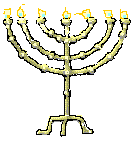
|
- The Ark of the
Testimony
- Exodus 25:10-22
|

|
- The Sacred Scrolls today are commonly called THE HOLY BIBLE.
- The Bible is a library unto itself, and the collections begins
with:
The Sacred Scrolls of
YHWH
 On Mt. Sinai, before Moses received the Ten Commandments
engraved by the finger of GOD on two stone tablets, he took some dictation.
The Scroll he produced was originally one continuous stream of approximately
304,805 Paleo (ancient) Hebrew characters directly dictated by YHWH, (generally pronounced YAHWEH in
English, commonly called GOD the FATHER). For safekeeping, the original copy was
kept in the Ark of the Testimony, pictured above.
On Mt. Sinai, before Moses received the Ten Commandments
engraved by the finger of GOD on two stone tablets, he took some dictation.
The Scroll he produced was originally one continuous stream of approximately
304,805 Paleo (ancient) Hebrew characters directly dictated by YHWH, (generally pronounced YAHWEH in
English, commonly called GOD the FATHER). For safekeeping, the original copy was
kept in the Ark of the Testimony, pictured above.
- (With
the building of the Tabernacle and Temple, the 7 branched lamp stand (called the
Menorah in Hebrew) was commanded to be built to light the interior. It's symbol,
the number 7, and the Ark, became became synonymous with our CREATOR,
Exo.25:31-40, Rev.2:5. Click
for more Temple info.)
Today this Scroll is called the
Five Books of Moses, or the Torah in Hebrew, and the Pentateuch in Greek.
In any Bible these books are always listed first as: Genesis
(Gen.); Exodus (Exo.); Leviticus (Lev); Numbers (Num.);
Deuteronomy (Deu.).
To simplify research and
study, each book of the Bible has a series of numbered chapters, and
each chapter is divided into numbered verses. These chapter and verse
citations are uniform throughout all of the Bible translations and are
written as: Book name, chapter #, verse #. For example: The second verse, of
the first chapter, of the first book of the Bible is written as Genesis 1:2,
or abbreviated as Gen.1:2.

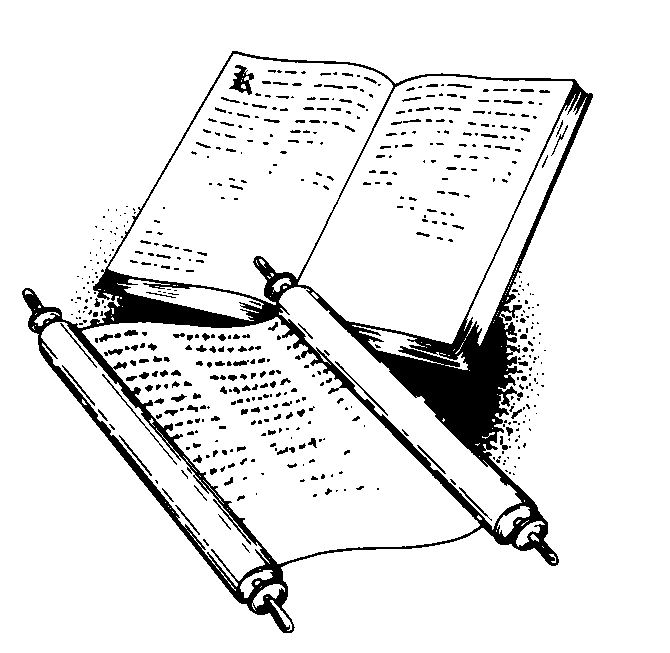 The Bible is broken down into two main testaments
beginning with: The Bible is broken down into two main testaments
beginning with:
- THE HEBREW TESTAMENT
- commonly called The Old Testament.
It
is a collection of ancient history, poetry, and the writings of the Prophets
called by YHWH to correct the people and pass along additional Divine
information. The Hebrews called these Sacred library of writings "the
TaNaKh." Which is an
acronym for the Torah (Law), Nebi'im (Prophets), Kethubim (Writings). Those who
taught the TaNaKh were called rabbi, meaning in Hebrew "my
teacher."
Ancient History
- Joshua (Jos.); Judges (Jud.); Ruth
(Rth.); 1,2 Samuel
(Sam.); 1,2 Kings (Kgs.),
- 1,2 Chronicles (Chr.); Ezra
(Ezr.); Nehemiah (Neh.);
Ester (Est.).
Poetry
Job, Psalms (Ps.); Proverbs (Pro.); Ecclesiastes
(Ecc.);
Song Of Solomon (Sol.).
Major Prophets
Isaiah (Isa.); Jeremiah (Jer.); Lamentations
(Lam.);
Ezekiel (Eze.); Daniel ( Dan.).
Minor Prophets
Hosea (Hos.); Joel (Joe.); Amos (Amo.);
Obadiah (Oba.);
Jonah (Jon.); Micah (Mic.); Nahum (Nah.); Habakkuk
(Hab.);
Zephaniah (Zep.);
Haggai (Hag.); Zechariah (Zec.); Malachi (Mal.).
- Editors' note: This is only a partial listing of the more
popular books.

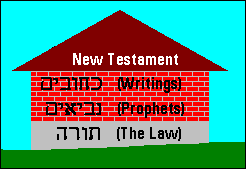 The second testament of the Bible is The second testament of the Bible is
-
THE HEBREW
"MESSIANIC" TESTAMENT
- commonly called the New Testament.
Not
without its controversies, it is a collection of books (save one) that were
written by Hebrews for Hebrews, and then for the Gentiles (Mat.10:5-7).
The first four four books are called "the
Gospels," which means "the Good News." The books center on
the direct teachings of the Hebrew Messianic Prophet called Yahshua, commonly
known as Jesus of Nazareth. They are: Matthew (Mat.), Mark (Mar.),
Luke (Luk.),
John (Jno.).
The next book Acts (Act.) is next, and it is the history
of the early Messianic movement after the death of Yahshua.
The other books consist of general letters of correction
and inspiration by the Apostles of Yahshua, to the newly formed Messianic
churches established in the Greek and Roman cultures to west of Jerusalem.
The collections begins with:
Letters
from the Apostle Paul to the:
Romans (Rom.); 1,2 Corinthians (Cor.); Galatians
(Gal.); Ephesians (Eph.); Philippians (Phi.); Colossians
(Col.);
1,2,
Thessalonians (Ths.); 1,2, Timothy (Tim.); Titus (Tit.); Philemon
(Phn.).
General Letters:
Hebrews (Heb.); James (Jas.); 1,2, Peter
(Pet.);
1,2,3,
John (Jno.); Jude (Jud.).
The last book Revelation (Rev.), is a book of prophecy
(companion book to the Book of Daniel), and
relates to the events of transition at the end of this age, leading to the
beginning of the next Messianic age.

Note: The Dark Side hates this
book, and their minions have been hard at work...
|
|
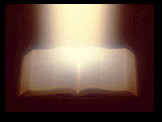
"So the hammers of infidels have
been
pecking away at this Book for ages,
but the hammers are worn out,
and the anvil still endures.
If this book had not been the book of
GOD,
men would have destroyed it long ago.
Emperors and popes, kings and priests,
princes and rulers,
have all tried their hand at it;
they die, and the Book still lives."
- - H.L. Hastings
|
|
- "All Scripture
is given by inspiration of God,
- and is profitable for
doctrine, for reproof, for correction,
- for instruction in
righteousness,
- that the man of God may
be complete,
- thoroughly equipped for
every good work."
- -2 Timothy 3:16,17
-
 The
Bible is the most unique book in the possession of humankind.
Many archaeological discoveries, such as the Dead Sea Scrolls, do more
to prove the integrity of the Bible, then disprove it. (For more
info see the links page
)
The
Bible is the most unique book in the possession of humankind.
Many archaeological discoveries, such as the Dead Sea Scrolls, do more
to prove the integrity of the Bible, then disprove it. (For more
info see the links page
)
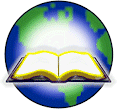 The
Bible is many things to many people. It is a book of tradition, a book
of freedom, a book of moral lessons, a book of healthcare, a book of
prophecy, a book of spiritual warfare, etc.. (And, we will touch
on a little of all of them.) The
Bible is many things to many people. It is a book of tradition, a book
of freedom, a book of moral lessons, a book of healthcare, a book of
prophecy, a book of spiritual warfare, etc.. (And, we will touch
on a little of all of them.)
 Think for a minute what the Bible claims to be,
it is the message from the CREATOR to the creation. The question is: How
does the CREATOR authenticate the message? How does HE prove to the creation
that HE is the one sending the message? The primary way HE has chosen to do
that is by telling the creation the future before it happens.
Think for a minute what the Bible claims to be,
it is the message from the CREATOR to the creation. The question is: How
does the CREATOR authenticate the message? How does HE prove to the creation
that HE is the one sending the message? The primary way HE has chosen to do
that is by telling the creation the future before it happens.
"...I am God, and there is
none like Me.
Declaring the end from the beginning.
And from ancient times
things that are not yet
done..."
- Isaiah 46:9-10
 Prophecy validates the Bible, and proves the
existence of the CREATOR. There are approximately 10,835 prophecies in the Bible, some are
of curses and punishments, some are of blessings and redemption, and they
are of two types, fulfilled, and unfulfilled. The fulfilled ones we learn from,
and the unfulfilled ones are the
ones we are watching for, (sometime in the future they will show up on the
radar screen). They are organized into three categories: Prophecy validates the Bible, and proves the
existence of the CREATOR. There are approximately 10,835 prophecies in the Bible, some are
of curses and punishments, some are of blessings and redemption, and they
are of two types, fulfilled, and unfulfilled. The fulfilled ones we learn from,
and the unfulfilled ones are the
ones we are watching for, (sometime in the future they will show up on the
radar screen). They are organized into three categories:
- [1] The Land: For example, in the Book of Daniel,
there are 135 prophecies, all previously fulfilled as written.
- [2] The Messiah: There are over 200
prophecies regarding the Messiah, all fulfilled in the life and death of
Yahshua).
- [3] The End Times (Eschatology): Are
prophecies that deal with death, resurrection, the end of the age,
Divine judgment, and the future world.
[ Click for more
info: Prophecy
page ]
 In
my opinion, the Bible is one of those books where it's best to read the
ending first. Begin by reading Revelation ch.19-22, it will give you a
vision of eternity and then you can decide which side you want to be on.
From there read the Book of Proverbs, it will help you form your framework
for your "method of getting into Heaven." Next, read
"the Gospels." In
my opinion, the Bible is one of those books where it's best to read the
ending first. Begin by reading Revelation ch.19-22, it will give you a
vision of eternity and then you can decide which side you want to be on.
From there read the Book of Proverbs, it will help you form your framework
for your "method of getting into Heaven." Next, read
"the Gospels."
 The
Bible should be read with sophistication. The only problem with
the Bible is man's narrow view of it. Most scholars agree when
studying ancient texts one must use the literal meaning of sentences as the
normal approach in all languages. The meaning must be interpreted in
the relation to the historical and grammatical context of the time in which
it originated. All secondary meanings of parables, allegories, and
symbols depend on the definition by the previous literal meaning of the
term. (Study Bibles are a big help in this area.) The
Bible should be read with sophistication. The only problem with
the Bible is man's narrow view of it. Most scholars agree when
studying ancient texts one must use the literal meaning of sentences as the
normal approach in all languages. The meaning must be interpreted in
the relation to the historical and grammatical context of the time in which
it originated. All secondary meanings of parables, allegories, and
symbols depend on the definition by the previous literal meaning of the
term. (Study Bibles are a big help in this area.)
When discussing the Bible, many times,
people will tell me that you cannot trust the Bible translations,
because some translators made changes to it, either from ignorance, honest
mistake, or for the purposes of deception. Fifty years ago it was a
good argument, but today, many archaeological discoveries, such as the Dead
Sea Scrolls, do more to prove the integrity of the Bible, then to disprove
it.
To compile the research for this
story, I used many Bible translations. I do not wish to debate the
merits of any of the Bible versions. In my opinion, there is still no
one perfect English translation - but they are getting better. One can
use any respected translation that they are comfortable with to follow the
general concepts of my presentation.
My purpose is the illumination of some
spiritual truths that are rarely taught. Although I quote certain
verses, space does not allow me to use the complete context in which the verse
is used. I encourage all readers to refer to their own Bibles, read with
sophistication and consider the complete historical context in which the verse
was quoted from.
[ Click for more info: Newsletter
Index look for National Bible Week ]
- Donations made with
no cost to you.

From the book
The
Mystical Rites of our CREATOR
ISBN 0-9675266-0-4
Copyright © 2000-2010 White Stone
Communications - HomeWorship101.com
Last modified: January 03, 2011
|
 Bible
Boot- Camp
[ Top GOD | Sacred
Scrolls | Re-Creation
of the Earth | Order
of Melchizedek | Sacred
Covenants
| .Hellenism
- Romanism |
Are
You the Messiah? | Age of
Grace | Prophecy
| Mystery of the Bride
|
Conquering
Messiah |
Judgment
Day ]
Bible
Boot- Camp
[ Top GOD | Sacred
Scrolls | Re-Creation
of the Earth | Order
of Melchizedek | Sacred
Covenants
| .Hellenism
- Romanism |
Are
You the Messiah? | Age of
Grace | Prophecy
| Mystery of the Bride
|
Conquering
Messiah |
Judgment
Day ] 
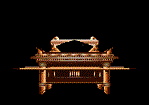
 On Mt. Sinai, before Moses received the Ten Commandments
engraved by the finger of GOD on two stone tablets, he took some dictation.
The Scroll he produced was originally one continuous stream of approximately
304,805 Paleo (ancient) Hebrew characters directly dictated by YHWH, (generally pronounced YAHWEH in
English, commonly called GOD the FATHER). For safekeeping, the original copy was
kept in the Ark of the Testimony, pictured above.
On Mt. Sinai, before Moses received the Ten Commandments
engraved by the finger of GOD on two stone tablets, he took some dictation.
The Scroll he produced was originally one continuous stream of approximately
304,805 Paleo (ancient) Hebrew characters directly dictated by YHWH, (generally pronounced YAHWEH in
English, commonly called GOD the FATHER). For safekeeping, the original copy was
kept in the Ark of the Testimony, pictured above.  The Bible is broken down into two main testaments
beginning with:
The Bible is broken down into two main testaments
beginning with: The second testament of the Bible is
The second testament of the Bible is 
 The
Bible is many things to many people. It is a book of tradition, a book
of freedom, a book of moral lessons, a book of healthcare, a book of
prophecy, a book of spiritual warfare, etc.. (And, we will touch
on a little of all of them.)
The
Bible is many things to many people. It is a book of tradition, a book
of freedom, a book of moral lessons, a book of healthcare, a book of
prophecy, a book of spiritual warfare, etc.. (And, we will touch
on a little of all of them.) Prophecy validates the Bible, and proves the
existence of the CREATOR. There are approximately 10,835 prophecies in the Bible, some are
of curses and punishments, some are of blessings and redemption, and they
are of two types, fulfilled, and unfulfilled. The fulfilled ones we learn from,
and the unfulfilled ones are the
ones we are watching for, (sometime in the future they will show up on the
radar screen). They are organized into three categories:
Prophecy validates the Bible, and proves the
existence of the CREATOR. There are approximately 10,835 prophecies in the Bible, some are
of curses and punishments, some are of blessings and redemption, and they
are of two types, fulfilled, and unfulfilled. The fulfilled ones we learn from,
and the unfulfilled ones are the
ones we are watching for, (sometime in the future they will show up on the
radar screen). They are organized into three categories: